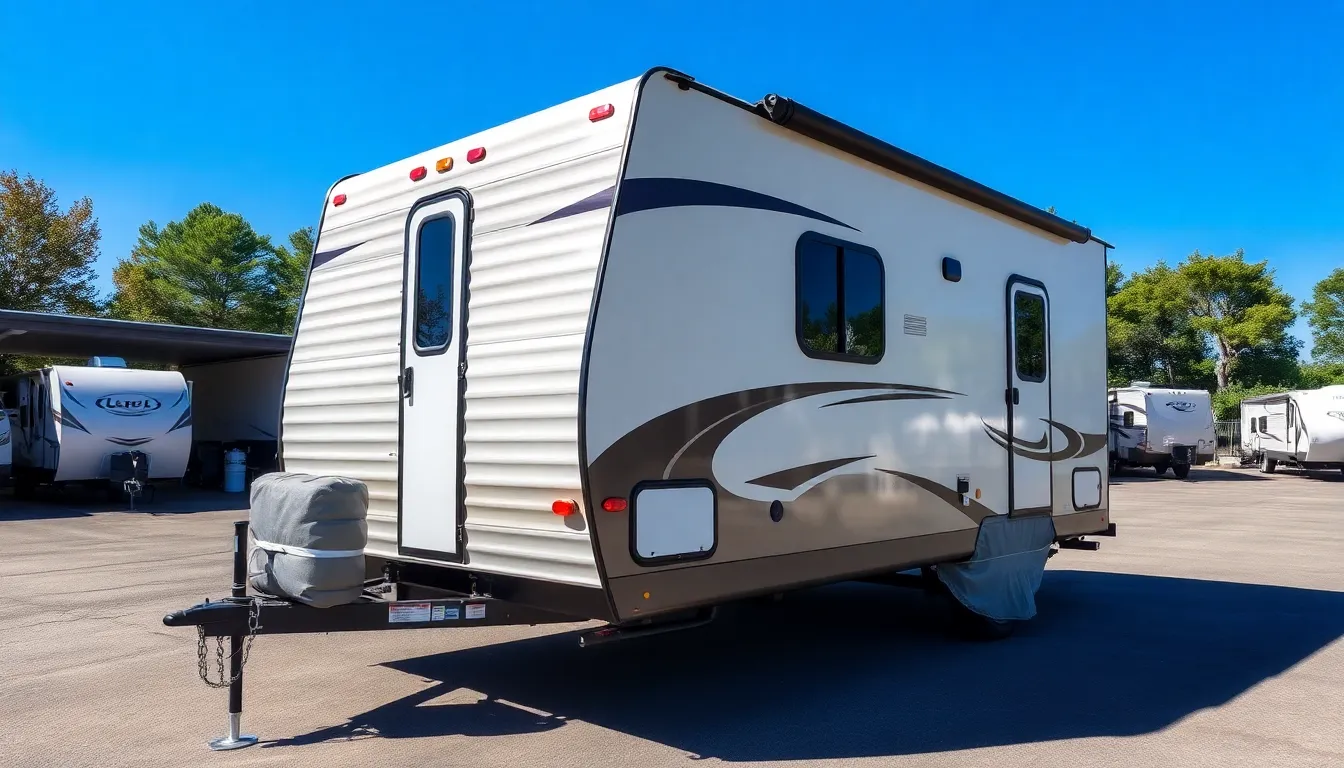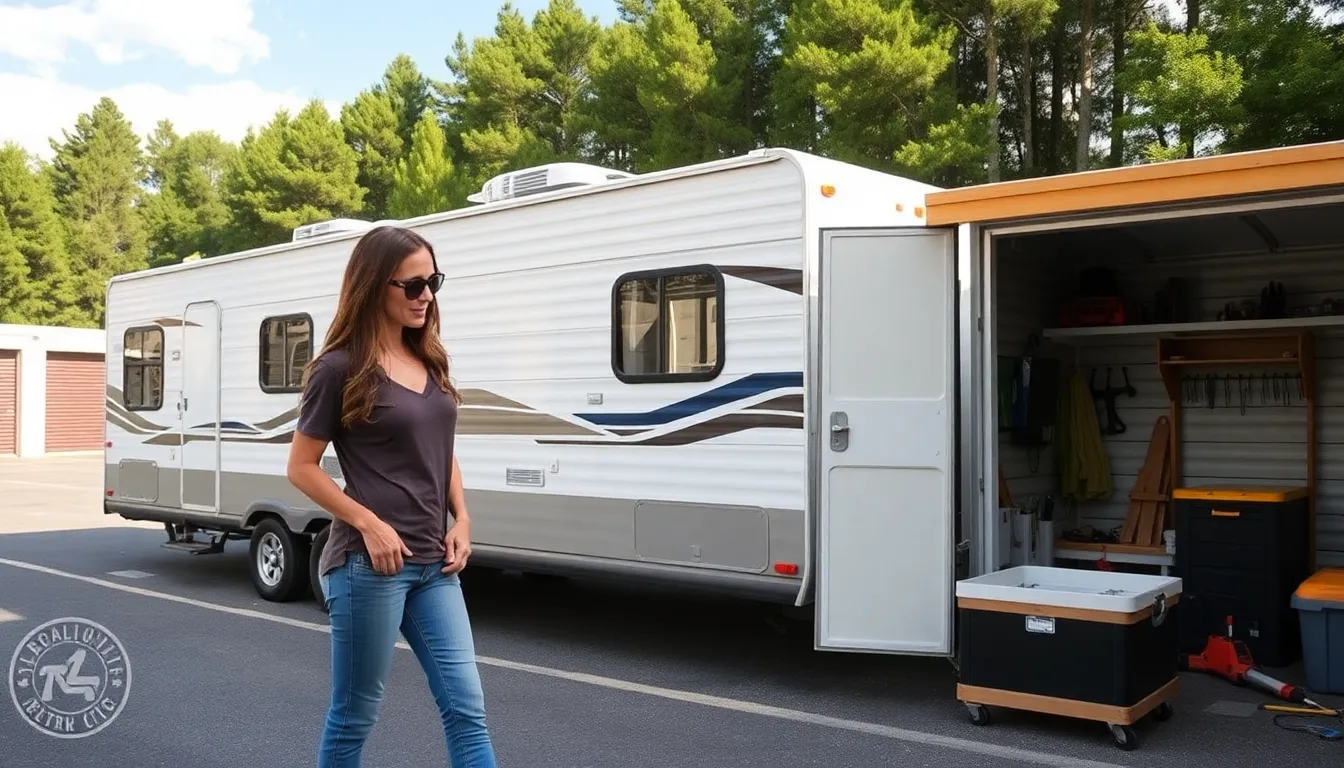Storing a travel trailer can feel like trying to park a whale in a sardine can. With all the excitement of hitting the open road, it’s easy to overlook the not-so-glamorous task of finding the perfect spot to stash your beloved vehicle when the adventure ends. But fear not! With a little planning and some clever tips, he or she can turn that daunting chore into a breeze.
From maximizing space to ensuring safety, the right storage solutions can keep your trailer in tip-top shape for the next escapade. So grab a cup of coffee, kick back, and let’s dive into the world of travel trailer storage. It’s time to discover how to keep that home on wheels ready for your next journey, without turning your yard into a trailer park.
Table of Contents
ToggleUnderstanding Travel Trailer Storage
Travel trailer storage involves various considerations to ensure the vehicle remains in optimal condition. Proper storage techniques help prevent damage and maintain organization after trips.
Types of Travel Trailer Storage
- Indoor Storage: Secured facilities protect trailers from weather elements and theft.
- Outdoor Storage: Open air spaces, often less expensive, require protective covers to guard against UV rays and precipitation.
- Self-Storage Units: These provide a controlled environment for added security, often with 24-hour access.
- RV Parks: Some parks offer long-term storage where trailers can remain hitched for convenience and reloading.
Benefits of Proper Storage
- Prolongs Lifespan: Storing trailers properly prevents wear and tear from environmental elements.
- Reduces Maintenance Costs: Proper care minimizes repairs over time, saving owners money in the long run.
- Enhances Safety: Secure storage locations deter theft and vandalism, ensuring peace of mind.
- Organizes Space: Effective storage keeps yards tidy and maximizes usable space for other activities or vehicles.
Tips for Storing Your Travel Trailer

Proper storage ensures the longevity and upkeep of a travel trailer. Following specific guidelines can simplify the process and maintain the trailer’s condition.
Preparing Your Trailer for Storage
Inspect the travel trailer thoroughly. Clean both the interior and exterior to prevent mold and pests. Drain all water tanks and lines to avoid freezing during colder months. Empty the refrigerator and remove any perishable items. Inflate tires to the recommended pressure and cover them to protect against UV rays. Disconnect the battery and store it in a cool place to enhance its lifespan.
Choosing the Right Storage Location
Select a storage location based on safety and accessibility. Indoor storage offers the best protection from weather and theft, while outdoor storage requires a high-quality cover for added defense. Self-storage units provide controlled environments, often with heightened security measures. RV parks with long-term storage options offer additional convenience. Ensure the chosen site is easily accessible for regular checks and maintenance.
Maintenance During Storage
Regular maintenance during storage keeps a travel trailer in top condition. Performing routine checks and upkeep helps identify potential issues before they worsen.
Regular Checks and Upkeep
Regular inspections ensure functionality. Check the roof for cracks or leaks at least once a month. Inspect seals around windows and doors for wear, replacing them as necessary. Examine wiring for signs of corrosion or damage, especially on battery connections. Test the brakes and lights before the next trip to confirm they work properly. Monitoring tire pressure prevents flat spots. If there’s a buildup of dust or debris, clean the trailer’s exterior regularly to maintain its appearance and protect surfaces.
Protecting Against Weather Damage
Protecting against weather damage is crucial for longevity. Use a high-quality cover to shield the trailer from UV rays and moisture. Ensure the trailer is stored in a dry location to prevent rust and mold. Apply a coat of wax on the exterior to guard against environmental elements. Enclose any vents securely to keep out rain. Utilize moisture-absorbing products inside the trailer to control humidity levels. Regularly check the trailer for signs of water intrusion or pest infestations, addressing any issues immediately to maintain structural integrity.
Cost Considerations for Travel Trailer Storage
Cost plays a crucial role in selecting travel trailer storage options. Various methods come with different price points and benefits.
Comparing Different Storage Options
Indoor storage typically offers the highest protection against elements and theft, costing between $100 to $300 monthly. Outdoor storage is more affordable, ranging from $30 to $100 per month but may require investing in protective covers to shield the trailer from weather damage. Self-storage units provide a middle ground, priced around $50 to $150 per month, combining accessibility with moderate security measures. RV parks often charge for long-term storage, averaging $50 to $200, alongside potential amenities like dump stations and water access. Evaluating the balance between cost and protection enables owners to choose the best fit for their needs.
Budgeting for Long-Term Storage
When budgeting for long-term storage, owners should consider initial setup costs and recurring fees. Factors influencing costs include location, facility type, and amenities. Creating a monthly budget allows for better financial planning, accommodating unexpected maintenance or additional protective measures, like a high-quality cover. Owners can take advantage of seasonal discounts offered by storage facilities that may significantly reduce overall expenses. Setting aside a portion of travel budgets for ongoing storage ensures accessibility and readiness for future adventures without compromising trailer security or maintenance.
Proper travel trailer storage is essential for maintaining its condition and ensuring it’s ready for the next adventure. By planning ahead and choosing the right storage option, owners can protect their investment from weather damage and theft. Regular maintenance during storage is equally important, helping to prolong the trailer’s lifespan and reduce future costs.
Budgeting for storage expenses allows for a smoother experience without sacrificing security or upkeep. With the right strategies in place, travel trailer owners can enjoy peace of mind knowing their vehicle is safe and well-maintained, paving the way for countless memorable journeys ahead.




